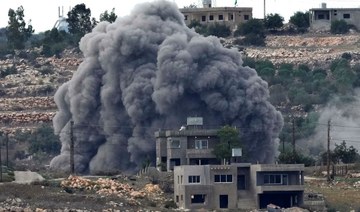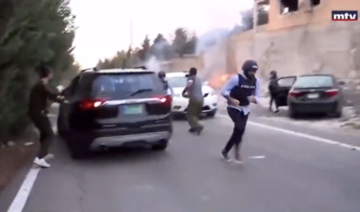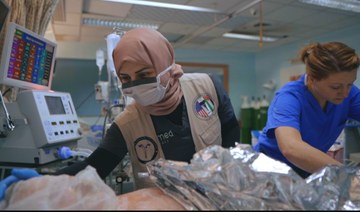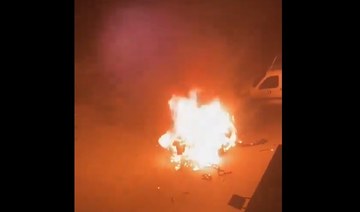MARJAYOUN, Lebanon: From his office overlooking the border with Israel, Dr. Mounes Klakesh can hear the thump of artillery rounds and air strikes landing on nearby Lebanese towns. The increasing frequency of those strikes has the staff of his small hospital on edge.
“We’ve already had to treat 51 people wounded by explosions in the last month or so. Seventeen of those died, or arrived dead. More than that and we’d be overwhelmed,” Klakesh said.
Klakesh, director of the Marjayoun Hospital in southern Lebanon, said it serves nearly 300,000 people in the area. It has 14 emergency beds and struggles to operate because of a lack of staff and, crucially, lack of fuel.
The hospital runs on generators 20 hours a day and has to pay up to $20,000 a month for the fuel. “None of that money comes from the government anymore. We rely on what funds the hospital has from one week to the next,” Klakesh said.
If the fuel runs out, the hospital closes. “We can’t just switch off part of the hospital.”
Dozens more public hospitals are in a similarly precarious state. Lebanon’s economic collapse in 2019 left them barely able to cope in peacetime.
Now, an escalating conflict on the southern border with Israel is pushing the health care sector into a new crisis. Doctors worry the latest Middle East war could stretch it beyond breaking point.
Fighting broke out here after Israel and Palestinian militant group Hamas went to war in the Gaza Strip on Oct. 7.
The Iran-backed Lebanese Hezbollah, a Hamas ally, has fired rockets at Israeli troops and Israel has bombed and shelled areas along the border in increasing attacks that are fueling concerns of a widening conflict.
It is the deadliest violence here since Israel and Hezbollah fought a devastating war in 2006 and has killed more than 70 Hezbollah fighters, 10 Lebanese civilians and 10 Israelis, mostly soldiers. Shells land on Lebanese towns and villages on a daily basis.
The hilltop hospital in Marjayoun has had its share of worse humanitarian crises. Doctors evacuated patients under Israeli air strikes during Israel’s 2006 invasion in which hundreds died. In the 1980s another Israeli invasion cut south Lebanon off from the rest of the country.
But this time, Klakesh and doctors in other hospitals say they are ill-equipped to handle any more than current levels of violence, let alone another major war.
Lebanon has lurched from one crisis to another in recent years. The 2019 financial collapse and a devastating chemical explosion at Beirut port in 2020 left the state crumbling.
Government money dried up, thousands of doctors and nurses left the country and hospital budgets were slashed.
’WE EXPECT STRIKES ON HOSPITALS’
Marjayoun Hospital is no exception. Many of its staff left for bigger cities or foreign countries, Klakesh said.
“We had four or five surgeons, bone doctors and women’s doctors, and we’ve maybe got one of each now which means they’re working long shifts on their own with no one to rotate in,” he said.
The Lebanese health ministry has said its budget can no longer meet demand. It rushed trauma kits to state hospitals this week, anticipating the worst. The International Committee of the Red Cross said it supplied fuel to hospitals including Marjayoun.
Emergency aid will only go so far if fighting intensifies, a surgeon at a private hospital in nearby Nabatieh said.
“Hospitals could maybe absorb 40 to 50 wounded a week, but if it’s more than that no hospital in Lebanon would cope properly,” Dr. Moussa Abbas said.
The Lebanese exodus after the financial crisis at least means there are fewer people left to treat, Klakesh said. But an influx of patients would clog the narrow driveway that feeds into the joint emergency room and reception area.
Klakesh equipped and renovated the hospital in the months before the financial crash, when government money was still available. He bought kidney dialysis machines and moved a laundry room to an outhouse to create more space to treat patients.
He worries that could all vanish in an air strike and has watched with horror the failure to protect medical staff in Gaza.
Israel’s Gaza bombardment has knocked out 25 hospitals in the besieged Palestinian enclave, Hamas officials say. Closer to home, Lebanese authorities said an Israeli shell hit a small hospital near the border last week.
“We don’t just worry about Israel hitting a hospital, we expect it. After what happened the other day we could be next,” he said.


























